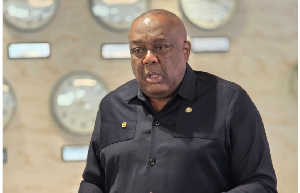An eight-member Board of the Ghana News Agency (GNA) chaired by Professor Olivia Kwapong, acting Dean, School of Continuing and Distance Education, University of Ghana, has been inaugurated in Accra.
The Board, which has a two-year mandate, was inaugurated by Mr Yaw Boadu Ayeboafoh, Chairman, National Media Commission (NMC).
Members of the Board include; Mr Albert Kofi Owusu, General Manger, GNA; Mr Ransford Tetteh, former Editor, Daily Graphic; and Mr Charles Acheampong of the National Communications Authority (NCA).
The rest are; Madam Doris Adabasu Kuwornu, former Director, Corporate Affairs, Ghana Broadcasting Corporation (GBC); Mr Peter Claver Nibepwo Sangber-Dery, former Deputy Director, Heritage Bank Limited; Mr Michael Antwi Agyei, Managing Editor, The Ghanaian Observer; and Dr Francis Grant Kwesi Gbormittah, lecturer in Media Arts, Department of Theatre Arts, University of Ghana.
Mr Boadu-Ayeboafoh, who counseled the Board and Management of the GNA to manage the resources of the agency; also urged them to take advantage of the Agency’s facilities in the regions and its products to turn its fortunes around.
He appealed to newspaper oraganisations to make it a point to renew their license of GH¢100.00 to help build a healthy and a better Ghana.
Prof Kwapong, who was also the Chair of the immediate past GNA Board, said for the next two years, the new Board would focus on GNA going digital, train editorial staff in multimedia journalism to leverage digital tools to boost the Agency’s presence on social media and invest in modern technology for operational efficiency and improvement in quality of service.
She urged Management to build the capacity of staff to enable them take up leadership positions.
Mr Owusu said the Agency since its establishment in 1957 was the most reliable source of news for other media houses and web portals.
He however noted that as a public service organisation solely dependent on government subvention, the Agency suffered from inadequate funding and a lack of investment for many years; and that had considerable effects on the Agency’s operations and often called into question, its relevance.
“However, we believe the GNA remains relevant for as long as Ghana remains a nation-state. The vision for setting it up is still relevant and important. The Agency works to promote national growth and the Ghanaian personality and identity,” Mr Owusu.
“Ghana is a developing nation; therefore, it is the media’s primary duty to churn out information that will foster national development. And as the largest news gathering body in Ghana, the GNA continues to bring the issues affecting the mass of our people to the attention of decision-makers; while at the same time educating the people about government policies and programmes,” he said.
“We give a voice to the voiceless and cover all aspects of our national life in a manner that impacts positively on the citizens.”
He said in the era of media pluralism, some players were only out there to make money with little regard for the impact of their operations on the country as many complaints about irresponsible journalism, sensationalism, excesses and media tyranny were regularly received.
“Therefore, it cannot be over-emphasised the need for a public service medium like the GNA to stick to the principles of journalism, and serve as an authentic source of news to steer the national discourse. These, among other reasons should justify government’s considerable funding support for the Agency’s operations. However, this has not been the case for sometime now,” he said.
He said the GNA’s financial constraints over the years created a backlog of outstanding needs that had to be met.
He said even though, for the first time in many years there was a significant improvement in the Agency’s budget for last year, thanks to Mr Kojo Oppong Nkrumah, the Minister for Information, who had spared no effort to support the turnaround of the Agency.
Mr George Sarpong, Executive Secretary, NMC, said a study by the Commission revealed that over 80 per cent of news reportage of radio stations outside Accra was from GNA.
General News of Tuesday, 14 January 2020
Source: ghananewsagency.org













